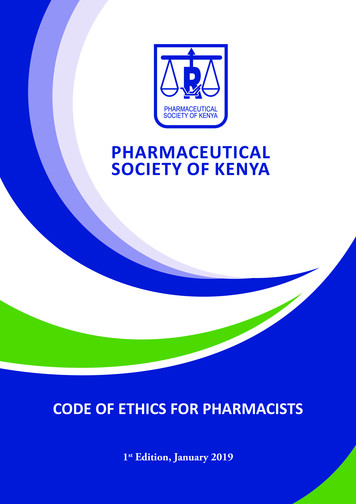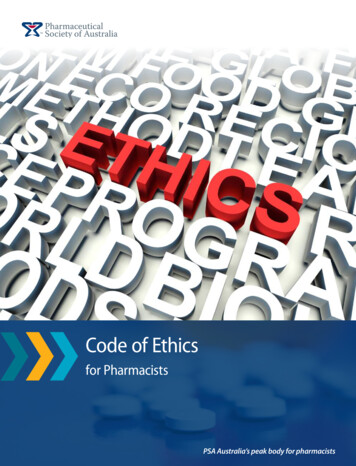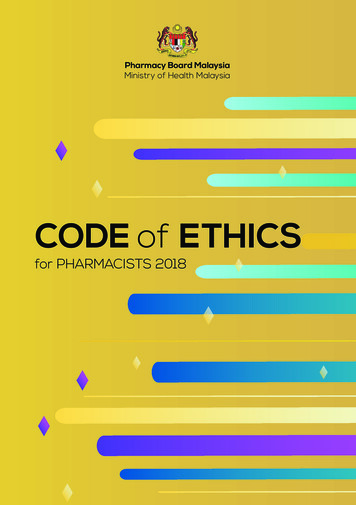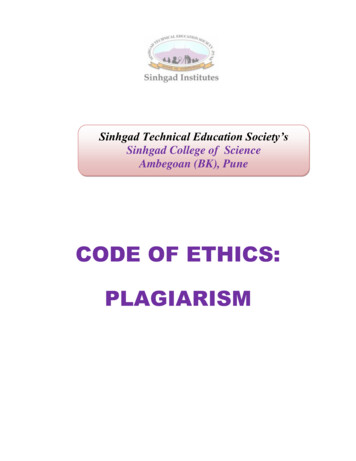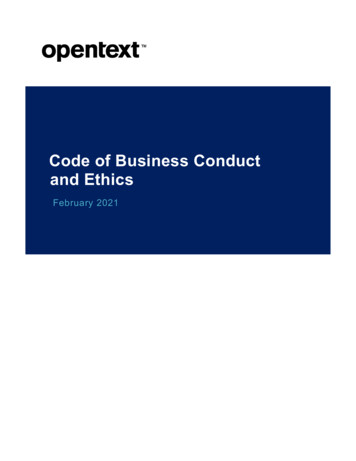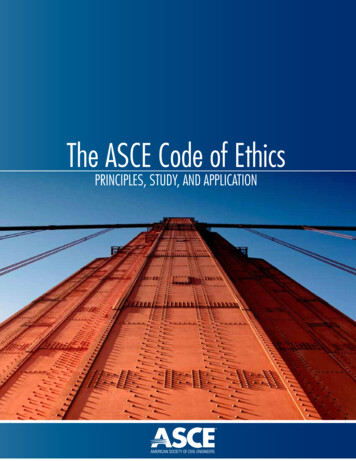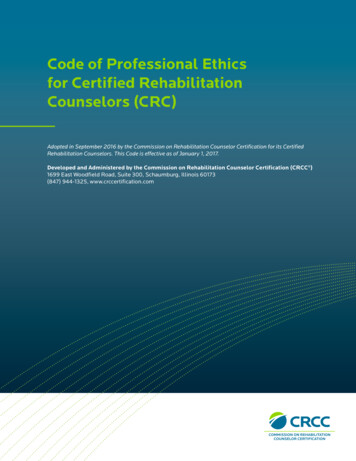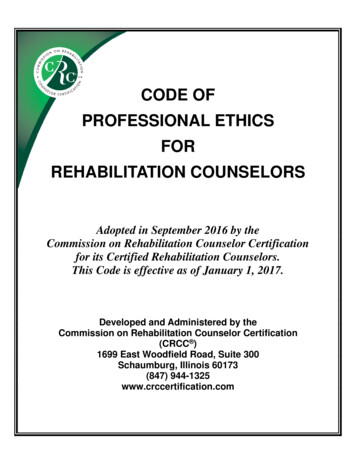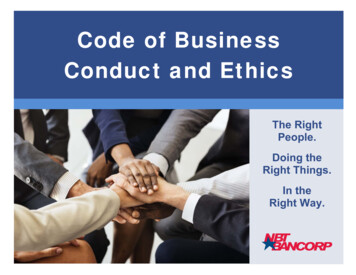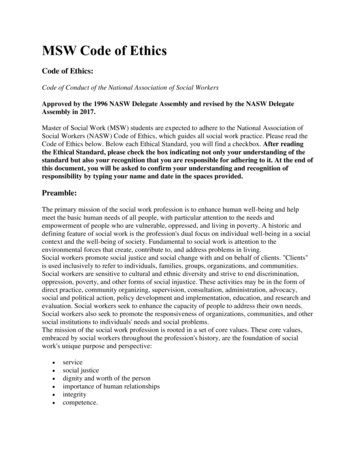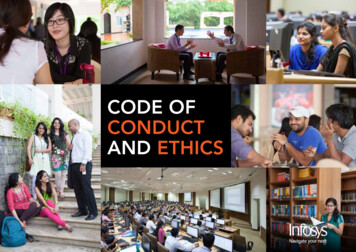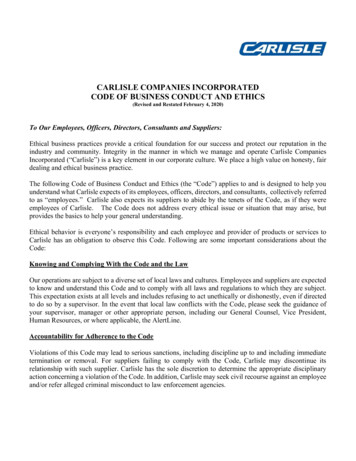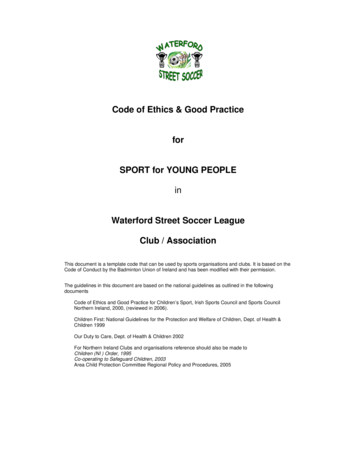
Transcription
Code of Ethics & Good PracticeforSPORT for YOUNG PEOPLEinWaterford Street Soccer LeagueClub / AssociationThis document is a template code that can be used by sports organisations and clubs. It is based on theCode of Conduct by the Badminton Union of Ireland and has been modified with their permission.The guidelines in this document are based on the national guidelines as outlined in the followingdocumentsCode of Ethics and Good Practice for Children’s Sport, Irish Sports Council and Sports CouncilNorthern Ireland, 2000, (reviewed in 2006).Children First: National Guidelines for the Protection and Welfare of Children, Dept. of Health &Children 1999Our Duty to Care, Dept. of Health & Children 2002For Northern Ireland Clubs and organisations reference should also be made toChildren (NI ) Order, 1995Co-operating to Safeguard Children, 2003Area Child Protection Committee Regional Policy and Procedures, 2005
Table of Contents2Core Values3Policies & GuidelinesPolicy Statement4Guidelines & Codes of Conduct(s) for Young Players5 for Parents6 for Sports Leaders9 for CoachesPolicies Disciplinary ProceduresRecruitment Policy for Sports Leaders / VolunteersBullying Policy101112 General Guidelines with Childreno Travelling, Supervision and Away Tripso Safety & Touching guidelineso Permission FormGuidelines on use of photographic and filming equipment13 Child Protection Procedures Responding to disclosure Reporting Procedures Allegations against Sports Leaders Confidentiality/Anonymous Complaints & RumoursAppendix 1: New Leader/Volunteer Information FormAppendix 2: Disclosure of Criminal Convictions & Permission for StatuaryChecks for those working with childrenAppendix 3: Existing Leaders/volunteer Information FormAppendix 4: Application & Parent Consent Form for youth members16181920212223/2425262
Core Values in Sport for Young PeopleThe work of the Waterford Street Soccer League is based on the following principlesthat will guide the development of sport for young people in this voluntaryorganisation, (as outlined in page 9, Code of Ethics and Good Practice for Children'sSport). Young People’s experience of sport should be guided by what is best for theyoung person. The stages of development and the ability of the young person shouldguide the types of activity provided within the group. Adults will need to have a basicunderstanding of the needs of young people, including physical, emotional andpersonal.Integrity in relationships:Adults interacting with young people in sport should do so with integrity and respectfor the child. There is a danger that sporting contexts can be used to exploit orundermine children. All adult actions in sport should be guided by what is best forthe child and in the context of quality, open working relationships. Verbal, physical,emotional or sexual abuse of any kind is unacceptable within sport.Quality atmosphere and ethosSport for young people should be conducted in a safe, positive and encouragingatmosphere. A child-centered ethos will help to ensure that competition andspecialization are kept in their appropriate place.EqualityAll children should be treated in an equitable and fair manner regardless of age,ability, sex, religion, social and ethnic background or political persuasion. Childrenwith disability should be involved in sports activities in an integrated way, thusallowing them to participate to their potential alongside other children.Fair Play:Fair play is the guiding principle of the Code of Ethics and Good Practice forChildren's Sport.All children’s sport should be conducted in an atmosphere of fair play. Ireland hascontributed and is committed to the European Code of Sports Ethics, which definesfair play as: “much more than playing within the rules”. It incorporates the conceptsof friendship, respect for others and always playing with the right spirit. Fair play isdefined as a way of thinking, not just behaving. It incorporates issues concerned withthe elimination of opportunities, excessive commercialisation and corruption.(European Sports Charter and Code of Ethics, Council of Europe, 1993).CompetitionA balanced approach to competition can make a significant contribution to thedevelopment of young people, while at the same time providing fun, enjoyment andsatisfaction. However, often competitive demands are placed on children too early,which results in excessive levels of pressure on them. This can contribute to a highlevel of drop out from sport. Leaders will aim to put the welfare of the child first andcompetitive standards second. A child-centred approach will help to ensure thatcompetition and specialisation are kept in their appropriate place.3
Policy StatementWaterford Street Soccer LeagueThe Waterford Street Soccer League is fully committed to safeguarding the wellbeing of its members. Every individual in the Waterford Street Soccer League shouldat all times, show respect and understanding for members rights, safety and welfareand conduct themselves in a way that reflects the principles of the voluntaryorganisation and the guidelines contained in the Code of Ethics and Good Practicefor Children’s Sport.In the Waterford Street Soccer League our first priority is the welfare of the youngpeople and we are committed to providing an environment which will allowparticipants to perform to the best of their ability, free from bullying and intimidation.The following pages provide codes of conduct, rules for traveling away, supervisionof young people, safety, recruitment and selection and reporting procedures for childwelfare and protection.4
Code of Conduct for Young PeopleWaterford Street Soccer League wishes to provide the best possible environment forall young people involved in the sport. Young people deserve to be given enjoyable,safe sporting opportunities, free of abuse of any kind. These participants haverights, which must be respected, and responsibilities that they must accept. Youngpeople should be encouraged to realise that they have responsibilities to treat otherparticipants and sports leaders with fairness and respect.Young players are entitled to: Be listened toBe believedBe safe and to feel safeBe treated with dignity, sensitivity and respectHave a voice in the organisationParticipate on an equal basisBe happy, have fun and enjoy sportExperience competition at a level at which they feel comfortableMake complaints and have them dealt withGet help against bulliesSay NoTo protect their own bodiesConfidentialityYoung players should always: Treat Soccer Leaders/Volunteers with respect, Play fairly at all times, do theirbest.Respect team members, even when things go wrong.Respect opponents, be gracious in defeat.Abide by the rules set down by team managers when travelling to awayevents.Behave in a manner that avoids bringing the sport of soccer into disrepute.Talk to children’s officer if they have any problems. (Vicki Langan).Young players should never: CheatUse violence or physical contact that is not allowed within the rulesShout or argue with officials, team mates or opponents (list appropriate inyour club)Harm team members, opponents or their propertyBully or use bullying tactics to isolate another playerUse unfair or bullying tactics to gain advantageTake banned substancesKeep secrets, especially if they have been caused harmTell lies about adults / young peopleSpread rumours5
Guidelines for Parents (See pages 30 – 31 of the Code)The Waterford Street Soccer League believes that parents should .Be a role model for your child and maintain the highest standards of conduct wheninteracting with children, other parents, with officials and organisersAlways behave responsibly and do not seek to unfairly affect the game / player (orinsert appropriate wording, e.g matchNever intentionally expose any young participant to embarrassment ordisparagement by the use of flippant or sarcastic remarksAlways recognise the value and importance of the volunteers who providesporting/recreational opportunities for your child. Do not publicly question thejudgement or honesty of referees, coaches or organisers. Respect referees,coaches, organisers and other players.Encourage your child to play by the rules. Teach your child that honest endeavour isas important as winning and do all you can to encourage good sportsmanship.Set a good example by applauding good play on both sides. Encourage mutualrespect for teammates and opponents,Parents should support all efforts to remove abusive behaviour and bullyingbehaviour in all its forms. Please read the bullying policy within the organisation’sguidelines.Parents Code of Conduct:1. I will respect the rules and procedures set down in The Waterford StreetSoccer League Code of Ethics for Children in Sport.2. I will respect my child’s teammates, leaders, (eg. coaches, officials, judges),and parents, as well as players, parents and coaches from opposing teams. Iwill encourage my child to treat other participants, coaches, selectors, andmanagers with respect.3. I will give encouragement and applaud only positive accomplishmentswhether from my child, his/her teammates, their opponents or the officials.4. I will respect my child’s leader(s) and support his/her efforts5. I will respect the officials and their authority during sessions and events(Training, League Games & Blitz)6. I will never demonstrate threatening or abusive behaviour or use foullanguage.6
Guidelines for Sports LeadersLeaders in children’s sport should strive to create a positive environment for thechildren in their care. They have an overall responsibility to take the necessary stepsto ensure that positive and healthy experiences are provided.The Waterford Street Soccer League recognises the key role leaders (coaches,selectors and team managers, etc.) play in the lives of children in sport.All Leaders/volunteers should have as their first priority the children’s safety andenjoyment of the sport and should adhere to the guidelines and regulations set out inthe club’s Code of Ethics.Leaders/Volunteers must respect the rights, dignity and worth of every child and musttreat everyone equally, regardless of sex, ethnic origin, religion or ability.Leaders/Volunteers working with young people in soccer should be suitable andappropriately trained. Leaders/Volunteers will be expected to go throughappropriate recruitment and selection procedures, (see application and referenceforms, Appendix 1-4), that apply to all persons with substantial access to youngpeople, whether paid or unpaid. References will be needed and will be followed up.There will be a ‘sign-up’ procedure, whereby the appointed/reappointed volunteersagree to abide by the Code of Ethics and Good Practice for Children in Sport and tothe policies and code of the organisation.Leaders/Volunteers will be given a copy of the organisations code of ethics and theyshould be made aware of the procedures contained within.Once appointed the Leader/Volunteers must act as a role model and promote thepositive aspects of sport and of soccer and maintain the highest standards ofpersonal conduct.The use of drugs, alcohol and tobacco must be actively discouraged as beingincompatible with a healthy approach to sporting activity.Remember your behaviour to players, other officials, and opponents will have aneffect on the players in your care.Be generous with praise and never ridicule or shout at players for making mistakes orfor losing a game. All young players are entitled to respect.Be careful to avoid the “star system”. Each child deserves equal time and attention.Care must be taken not to expose a child intentionally or unintentionally toembarrassment or disparagement by use of sarcastic or flippant remarks about thechild or his/her family.Physical punishment or physical force must never be used. Never punish a mistake by verbal means, physical means, or exclusion.Insist that players in your care respect the rules of the game. Insist on fair play andensure players are aware you will not tolerate cheating or bullying behaviour.7
Remember that young players play for fun and enjoyment and that skill developmentand personal satisfaction have priority over highly structured competition. Nevermake winning the only objective.Encourage the development of respect for opponents, officials, selectors and othercoaches and avoid criticism of fellow coaches.When travel/overnight travel is involved, the Leaders/Volunteers traveling withchildren must sign a separate agreement. Parents and participants will also beasked to sign permission forms in these instances.Leaders/Volunteers are responsible for setting and monitoring the boundariesbetween a working relationship and friendship with players. It is advisable forcoaches not to involve young players in their personal life i.e. visits to coaches homeor overnight stays.Avoid working alone and ensure there is adequate supervision for all activities.It is important to realise that certain situations or friendly actions could bemisinterpreted by the participant or by outsiders.When approached to take on a new player, ensure that any previous coach-studentrelationship has been ended by the student/others in a professional manner.When young players are invited into adult groups/squads, it is advisable to getagreement from a parent/career. Boundaries of behaviour in adult groups arenormally different from the boundaries that apply to junior groups/squads.Leaders/Volunteers who become aware of a conflict between their obligation to theirplayers and their obligation to their governing body must make explicit the nature ofthe conflict and the loyalties and responsibilities involved, to all parties concerned.Leaders/Volunteers should communicate and co-operate with medical and ancillarypractitioners in the diagnosis, treatment and management of their players’ medical orrelated problems. Avoid giving advice of a personal or medical nature if you are notqualified to do so. Any informa
The following pages provide codes of conduct, rules for traveling away, supervision of young people, safety, recruitment and selection and reporting procedures for child welfare and protection. 5 Code of Conduct for Young People Waterford Street Soccer League wishes to provide the best possible environment for all young people involved in the sport. Young people deserve to be given enjoyable .
